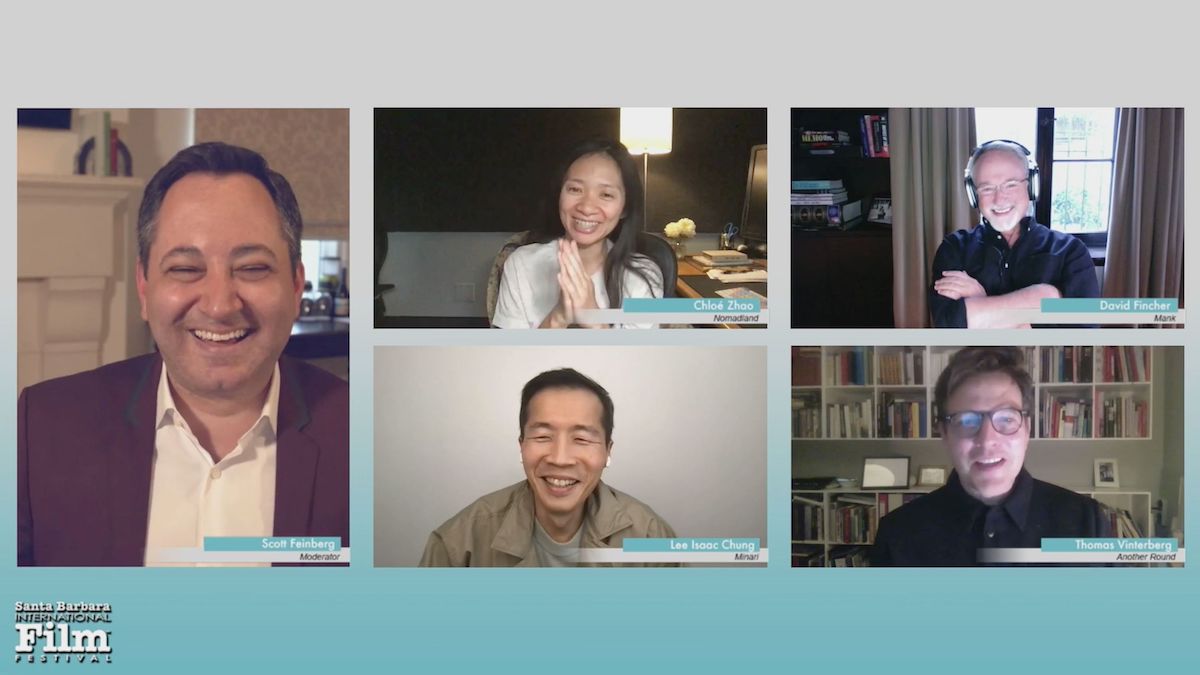SBIFF Day Seven Report: Director’s Panel; Films from Iceland and Turkey
Fascinating Director’s Panel; Plus, Films from Iceland, Turkey, and Elsewhere

Fascinating Director’s Panel; Plus, Films from Iceland, Turkey, and Elsewhere

All due respects to the celebrity glitz and intelligence of mostly Oscar-kissed actors whose tributes up the game of public appeal during SBIFF time, one of the more fascinating developments of recent vintage at the festival has been the evening when directors get their spotlight. Sometimes, the “Outstanding Directors” award tradition — now a decade deep at the festival — ranks higher in content and cinematic intrigue than the star gawk moments on the roster.
It’s too early to say in this strange largely virtual quirk of a SBIFF year, but Tuesday night’s directors’ night out, hosted by Hollywood Reporter and host Scott Feinberg, was clearly one of the bright spots in this necessarily oh-so-bizarre, weirdly distanced festival so far.
Here we had a four-pack of strikingly fine and important directors currently alive and in the awards fishbowl on a mosaic zoom stage together: two veterans, David (Mank) Fincher and great Dane (sorry) Thomas (Another Round) Vinterberg, plus two relative newcomers to the big game, auteur writer-directors Chloe (Nomadland) Zhao and Lee Isaac (Minari) Chung. Each director’s work is distinctive unto itself, but perhaps connected to the profound notion of personal stories wedded to grand themes.
And on this magical hour-plus meeting of directorial mastery, one of the most charming moments came towards the end, after the individual interviews dredged commentaries from the artists who have likely had to utter these words and ideas endlessly on the awards-season circuit. When asked if these artists had previously met, the most seasoned and widely-heralded of the bunch, Finch served as the sagacious one, noting, “Directors never meet. Actors connect all the time. They are in the traveling circus. We’re usually cloistered.”
Zhao jumped in with a kudo for her Danish comrade, gushing that “Dogme 95 [the raw-spirited and rebellious Danish movement from the ‘90s including Vinterberg and Lars Von Trier] was like a religion to me.” Vinterberg immediately replied, with a grin, “You have an open invitation by the brotherhood to do a Dogme movie.”
Vinterberg then referred back to Zhao’s earlier comment about appreciating the process of editing, and working with a limited set of material, within a box. “You talk about working in a box,” he commented, “and giving yourself sharp edges, and feeling liberated. That is something we embraced.” He later praised Zhao’s poetic attention to detail in her stunning study of American rootlessness.
Passing compliments forward, Vinterberg also addressed Fincher’s zoomy cube, admitting that his virtuoso film Another Round was “inspired by Fight Club.” Fincher, chuckling: “That makes sense. We were drunk.”
Later, Fincher expressed his own admiration for the Dogme ’95 manifesto, even despite the big budget Hollywood trappings of his films. “I love the idea of making a movie with 25 people, but it ends up being the three-ring circus. I’m so tired of semi, semi, semi…”
Vinterberg: “Here’s another invitation [to the Dogme fight club].”
This is the vivid, interactive stuff of what makes a good film festival, such as SBIFF, peel back layers of typical Hollywood fluff and get to some essences of what makes cinema such a powerful medium. It was a veritable mutual admiration societal love fest up there, sans apparent show biz lip service to get in the way.
FILM GAB: One of my favorite SBIFF films so far is also one of the humblest, in production terms. Icelandic writer-director Marteinn Thorsson’s beautiful, understated Backyard Village takes place, interestingly enough, in the very tourist cabin compound an hour-ish from Reykjavik which he actually owns. (I’m already making plans to visit).
In this gentle tragicomic tale, two characters meet by happenstance at said “Village”: a woman mending psychic wounds at a health spa and a coolly witty British man with a sad connection to the wintry Icelandic landscape. Without venturing into dreaded sin of plot spoilage, suffice to say the unfolding narrative and haunting back stories of its principles is wonderfully wrapped into a nonetheless life-affirmative film which takes in the spare, unspoiled Icelandic terrain with a minimalist visual approach by cinematographer, enhanced by the hypnotic ambient music by young Icelandic singer/composer Jófríður Ákadóttir. Check her, and it, out.
It’s quite a different story and storytelling approach in the case of the potent Turkish film When I’m Done Dying, director Nisan Dağ’s edgy yet also compassionate study of a young rapper (Oktay Cubuk, in a memorable performance) falling prey to the relatively recent scourge of the drug Banzai, a cheap synthetic cannabis drug which accounts for the largest percentage of drug-related deaths in Turkey at the moment.
Closer to home, the theme of addiction and its deadly perils — and hopes of recovery — is frankly and emotionally addressed in Lane Michael Stanley’s indie film Addict Named Hal. Loosely based on the writer-director’s own brush with a six-month stint in rehab, the film pulls no punches and makes a bold dramatic impact.
Fate challenges but ultimately favors a hopeful outcome in Latvian director Dace Puce’s lovely film The Pit (Bedre). Our young hero, Markuss, faces struggles as the son of a late junkie father in a harshly provincial environment, and bonds with a hermit-like stained-glass artist guiding him into a light of transcendence. An illuminating blend of melodrama and metaphorical parable, The Pit champions the outlier, childhood division.
ALSO RECOMMENDED: A contender among the altogether strong documentary component of SBIFF 2021, the refreshingly narration-free and slice-of-life Swiss doc Mirage (Miraggio), about African refugees in limbo, in Italy, and, for feelgood cinema fans, a enjoyable Greek bon bon, The Man with the Answers.
Support the Santa Barbara Independent through a long-term or a single contribution.
Please note this login is to submit events or press releases. Use this page here to login for your Independent subscription
Not a member? Sign up here.